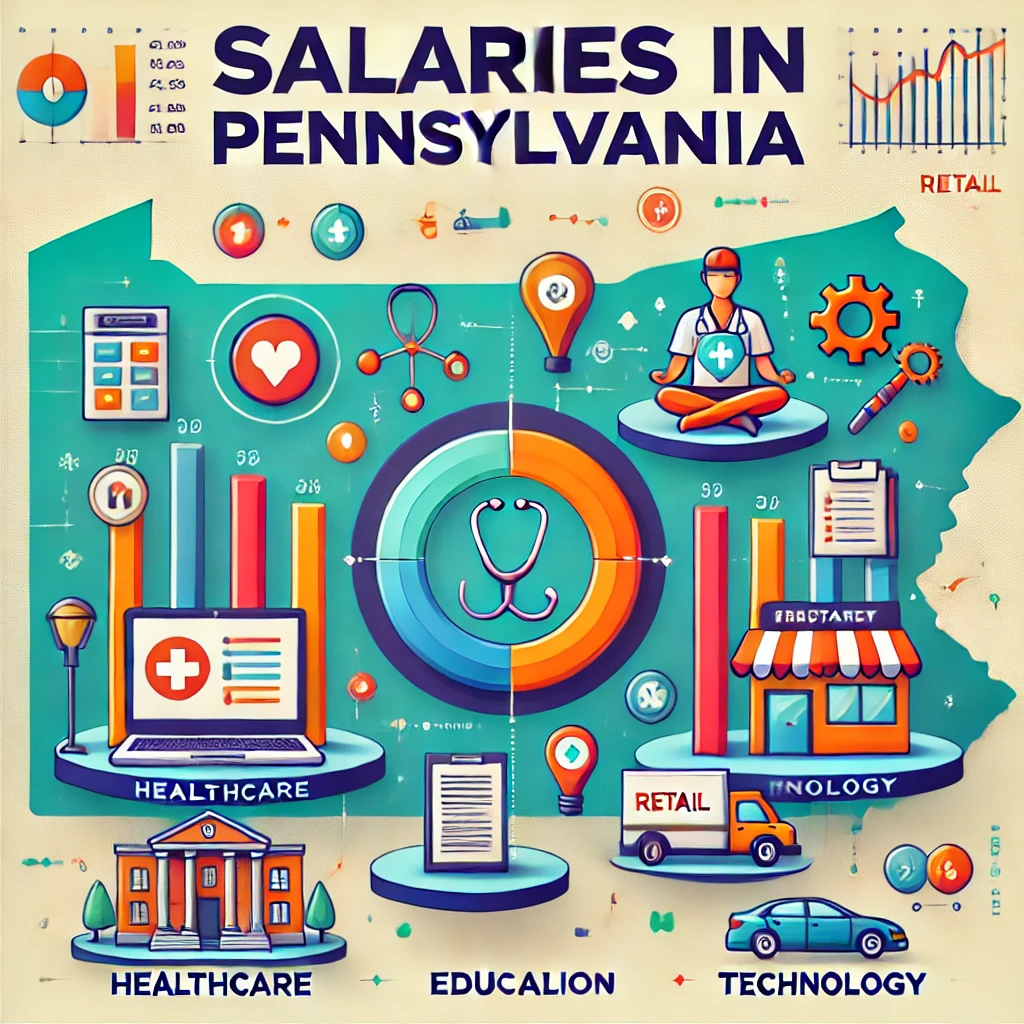Introduction
Pennsylvania, one of the most populous states in the United States, boasts a diverse economy supported by industries such as manufacturing, healthcare, education, energy, and technology. Known for its industrial heritage, Pennsylvania has transitioned into a modern economic hub, balancing traditional sectors with emerging industries.
The state’s salary landscape is shaped by factors such as industry, geographic location, cost of living, and educational attainment. From urban centers like Philadelphia and Pittsburgh to rural areas and small towns, salaries vary widely. This article explores Pennsylvania’s salary trends, key industries, and regional differences, providing a comprehensive understanding of the state’s labor market.
Factors Influencing Salaries in Pennsylvania
Several factors contribute to the variation in salaries across Pennsylvania:
- Industry: Pennsylvania’s economy is driven by diverse sectors, including healthcare, manufacturing, technology, education, and energy. Salaries vary significantly by industry, with healthcare and technology often leading in compensation.
- Location: Urban areas such as Philadelphia and Pittsburgh offer higher salaries compared to rural regions, reflecting the concentration of industries and higher living costs in metropolitan areas.
- Education and Skills: Higher education levels and specialized skills typically lead to better-paying jobs. Industries like healthcare and technology offer premium wages to individuals with advanced degrees and certifications.
- Cost of Living: Salaries in Pennsylvania are often influenced by regional cost-of-living differences, with urban areas demanding higher wages to offset higher housing and transportation costs.
- Experience: Professionals with years of experience and senior-level roles tend to command higher salaries, particularly in competitive industries such as finance, technology, and engineering.
Median Salaries by Industry in Pennsylvania
Pennsylvania’s median annual salary is slightly above the national average due to its diverse economy and concentration of high-paying industries in urban centers. Here’s a breakdown of salaries in key sectors:
Healthcare
- Registered Nurses (RNs): $75,000
- Physicians and Surgeons: $220,000+
- Healthcare Administrators: $105,000
- Medical Technologists: $60,000
Healthcare is a dominant industry in Pennsylvania, supported by world-renowned hospitals and healthcare systems in Philadelphia and Pittsburgh.
Manufacturing
- Industrial Engineers: $85,000
- Machine Operators: $50,000
- Quality Control Specialists: $60,000
- Plant Managers: $95,000
The manufacturing sector remains strong in Pennsylvania, particularly in steel, machinery, and food production.
Technology
- Software Developers: $100,000
- Data Analysts: $85,000
- IT Specialists: $80,000
- Cybersecurity Experts: $110,000
Philadelphia and Pittsburgh have become emerging tech hubs, attracting startups and established firms, resulting in competitive salaries.
Education
- Public School Teachers: $65,000
- University Professors: $90,000 to $130,000
- Educational Administrators: $100,000
The education sector in Pennsylvania is robust, with competitive salaries for educators, particularly those in urban school districts and higher education institutions.
Energy
- Petroleum Engineers: $130,000
- Energy Technicians: $60,000
- Environmental Scientists: $75,000
- Renewable Energy Specialists: $80,000
The state’s energy sector, including natural gas extraction from the Marcellus Shale, is a significant contributor to high-paying jobs in Pennsylvania.
Retail and Hospitality
- Retail Managers: $50,000
- Chefs: $55,000
- Hotel Managers: $60,000
- Customer Service Representatives: $40,000
While salaries in retail and hospitality are modest, these industries are essential for the state’s tourism-driven economy.
Regional Salary Variations in Pennsylvania
Philadelphia
As Pennsylvania’s largest city and economic hub, Philadelphia offers some of the highest salaries in the state. Key industries include healthcare, finance, and technology:
- Healthcare Administrators: $120,000
- Software Developers: $105,000
- Financial Analysts: $90,000
Pittsburgh
Pittsburgh has transitioned from its industrial roots to a tech and healthcare powerhouse. The city offers competitive wages in:
- Software Development: $100,000
- Engineers: $95,000
- Nurses: $80,000
Harrisburg
As the state capital, Harrisburg provides stable government and administrative jobs:
- Government Administrators: $85,000
- Lawyers: $100,000
- Accountants: $70,000
Rural Pennsylvania
Rural areas tend to offer lower salaries but compensate with a lower cost of living. Key industries include agriculture, energy, and manufacturing:
- Farm Managers: $55,000
- Forestry Workers: $50,000
- Retail Workers: $35,000
Cost of Living and Salary Comparison
Pennsylvania’s cost of living is close to the national average, but regional variations are significant:
- Philadelphia’s housing and transportation costs are above average, demanding higher salaries.
- Pittsburgh offers a lower cost of living, making its competitive salaries attractive.
- Rural areas are highly affordable, though salaries are correspondingly lower.
Trends in Salary Growth
Healthcare Expansion
As the population ages, demand for healthcare professionals is rising, driving salary growth in this sector, particularly for nurses, physicians, and administrators.
Technology Advancements
Philadelphia and Pittsburgh are becoming tech innovation centers, attracting high-paying roles in software development, data analysis, and cybersecurity.
Renewable Energy
Pennsylvania’s focus on sustainability and renewable energy is creating high-paying jobs in wind, solar, and environmental science fields.
Manufacturing Revitalization
Advancements in automation and technology are reshaping manufacturing, increasing demand for skilled workers and driving up salaries.
Conclusion
Salaries in Pennsylvania reflect the state’s economic diversity, regional variations, and evolving industries. Urban centers like Philadelphia and Pittsburgh offer higher wages and career opportunities, while rural areas provide affordable living with steady job options.
With strong industries in healthcare, technology, manufacturing, and education, Pennsylvania continues to attract professionals seeking competitive salaries and a balanced quality of life. As the state invests in emerging sectors like renewable energy and tech innovation, salary growth and workforce opportunities are expected to remain strong.




